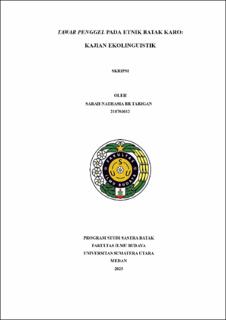Tawar Penggel Pada Etnik Batak Karo: Kajian Ekolinguistik
Tawar Penggel Among the Batak Karo Ethnic Group: An Ecological Linguistic Study

Date
2025Author
Tarigan, Sarah Nathasia Br
Advisor(s)
Herlina, Herlina
Tampubolon, Flansius
Metadata
Show full item recordAbstract
This thesis entitled "Tawar Penggel in the Batak Karo Ethnic Group: Ecolinguistic Study", analyzes the tawar that has been used for generations in traditional medicine for the Batak Karo Ethnic Group. The Tawar Penggel is made from natural spices and is only used in traditional bone fracture treatment. This study aims to explain the ecolinguistic aspects of the Tawar Penggel of the Batak Karo ethnic group, including the description of the flora lexicon, ecology, ingredients, benefits and techniques of use. The theoretical framework applied in this study is the ecolinguistic theory proposed by Einer Haugen in the book Nuzwaty. The research method used is descriptive qualitative. The results of the study presented 28 biotic lexicons and were divided into 28 flora lexicons. This study also explains the ecolinguistic aspects of the components used in making Tawar Penggel in the Batak Karo ethnic group, including the benefits of each component that are closely related to the life of the Batak Karo ethnic group, in addition to the habitat and ecology of each of these ingredients. Ecolinguistic theory, as used by Einer Haugen in Nuzwaty's book, explains the interaction between language, ecology, and human roles in the context of tawar penggel in the Batak Karo ethnic group as part of traditional healing practices. The richness of the lexicon in tawar penggel is a form of interrelation of the richness of experience and physical knowledge that exists around the Batak Karo ethnic community.
Collections
- Undergraduate Theses [247]
